TODAY’S READING FROM THE OLD TESTAMENT-
We start reading 1 Chronicles today. 1 and 2 Chronicles were originally one book, simply titled “The Book of Chronicles,” and although it comes right after I and II Kings in our Bibles, it appears as the last book of the Hebrew Scriptures (The Jewish Old Testament, the Tanakh). This is because it is a summary of Israel’s history, written from the priests’ point of view, focusing on the southern kingdom of Judah. The northern kingdom of Israel is only mentioned in cases where Judah is involved.
Although we do not know the author, we know it was written probably in the 5th century BC, after the Israelites return from their captivity in Babylon and after the temple and city of Jerusalem has been rebuilt. By this time in their history, it is clear that the Messianic promises have not been fulfilled in any of their earthly kings, not even David or Solomon. And there are ‘no more sons of David’ reigning on the throne.
It is interesting that the focus in Chronicles is on the positive aspects of David’s life and his kingdom reign. David is seen as a prototype of a greater king to come, who would be hailed as “the Son of David,” Jesus of Nazareth, the Son of God.
The first word in 1 Chronicles is “Adam.” He is the starting point. The last paragraph is about King Cyrus of Persia proclaiming that the time of the people of Israel’s captivity is at last over. The last sentence of the book is grammatically incomplete. It leaves us anticipating something or Someone to come! It hints at a greater return from exile. Someone is coming. The Messiah. “Let Him go up” (2 Chronicles 36:23). These Books prepare us for the arrival of Jesus.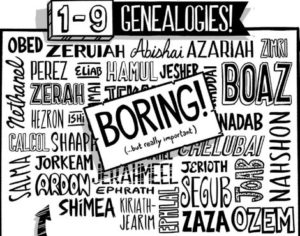
The more often you read through the Bible, the more exciting the reading of the genealogies becomes. You will be tempted to skip them and deem them boring. It may be difficult to read, but they are important. You recognize the names and the histories of these very real people as you become more familiar with the Bible. The genealogies help us see how these individuals are related to one another and the overall story- God’s history of redemption. Because the focus is on the story of redemption, there is no mention of Cain or Abel. We go from ‘Adam’ to ‘Seth,’ the substitute. We follow the line of God’s election. He chooses the one He will use.
The importance of the genealogies was highlighted during the captivity. There was a concern that their birth records would be lost while in Babylon, as well as their claims of inheritance in the Promised Land when they return. The genealogies gave proof that they were descendants of Abraham. The genealogy kept the record of their tribal ancestry. Most importantly, the genealogy highlights the Old Testament promise that the Messiah would be both a descendant of Abraham and David. The Gospels of Matthew and Luke support with their genealogies that Jesus is the fulfillment of that promise.
Reading 1 Chronicles Chapters 1 and 2 will remind you of what we read earlier this year in the Book of Genesis. 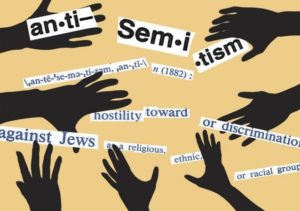
You may wonder how the word ‘Semite’ became a reference to Jews. Sadly, we are too familiar with the term ‘Anti-Semitism,’ which describes opposition to the Jews. The word ‘Semite’ comes from ‘Shem,’ the son of Noah. When you read the genealogies, you read how the ancestor of Abraham was ‘Shem’ (1 Chronicles 1:4, 17, 24). Another ancestor of Abraham was ‘Eber,’ the great-grandson of ‘Shem’ (1 Chronicles 1:18). The word ‘Hebrew’, meaning ‘to cross over or traverse’, is believed to be derived from the name ‘Eber’ because ‘Eber’ is regarded as one of the ancestors of the Hebrew race (from across the Euphrates River).
You will be familiar with many of the names in the genealogy listed in Chapter 2. You will recognize the 12 sons of Jacob (the patriarchs of the twelve tribes of Israel).
TODAY’S READING FROM THE NEW TESTAMENT – ACTS 23:11-35
Acts 23:11 11 But on the night immediately following, the Lord stood at his side and said, “Take courage; for as you have solemnly witnessed to My cause at Jerusalem, so you must witness at Rome also.”
How encouraging it must have been for the Apostle Paul to receive this word from the Lord! There must have been some days when Paul thought his life was over. But the Lord assured Paul that not only would he ‘survive Jerusalem’ but God had a work for him to do in Rome. (The Lord was a little short on giving details of the suffering, the shipwreck, and imprisonments awaiting him along the way, but we trust that was for the best!)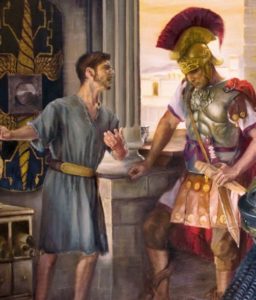
More than 40 Jews who opposed Paul and his gospel ministry made an oath that they would not eat or drink till they killed him. They planned to trap him by inviting him to another hearing with the Sanhedrin. Paul’s nephew heard of this conspiracy and warned the commander of the barracks, who rescued Paul by sending him to Caesarea with an escort of 200 soldiers, 70 horsemen, and 200 spearmen at night!
Dr. Luke must have had access to the letter that the commander wrote to Governor Felix, the Roman procurator of Judea, from AD 52 to 59. He quotes it here. This is the same office that Pontius Pilate once occupied. The Jews deeply resented Roman occupation and taxes. Felix was particularly hated. The riots among the Jews that resulted under his rule led to him eventually being recalled to Rome. Felix tried to win Jewish favor by keeping Paul imprisoned for at least two years (Acts 24:27).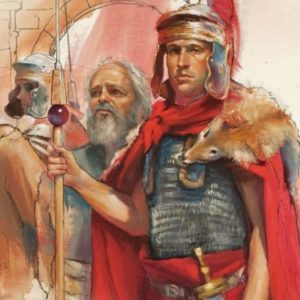
Through these difficult circumstances, God was giving Paul an opportunity to expand his ministry and bring the gospel to Roman officials and eventually to the seat of the Roman Empire.
We pray for open doors to testify of the gospel. Paul’s story reminds us that the open doors for gospel ministry rarely come with comfort and convenience (1 Corinthians 16:9).
Therefore, we are told to endure hardness as good soldiers of Christ Jesus (2 Timothy 2:3).
TODAY’S READING FROM THE BOOK OF PSALMS: PSALM 3
This is the first time we find the word ‘psalm’ (meaning ‘to pluck strings’) in the book of Psalms, and it is also the first prayer. It starts with a personal lament.
The Psalmist experiences trials: foes, accusations, ridicule, and disbelief. He speaks of having tens of thousands who oppose him. This psalm is attributed to David. It is believed to have been written when he had to flee Jerusalem when his son, Absalom, usurped the throne and turned people against him.
Despite his hardships, he takes stock of his benefits: The Lord is his shield, his glory, the lifter of his head, the one who answers his prayers, sustains him, giving him both rest and sleep. The Lord gives the Psalmist courageous faith and deliverance.
The Psalmist closes the Psalm with a blessing for the Lord’s people. Blessed people are happy to bless others!
TODAY’S READING FROM THE BOOK OF PROVERBS: PROVERBS 18:14-15
Proverbs 18:14-15 14 The spirit of a man can endure his sickness, but as for a broken spirit who can bear it? 15 The mind of the prudent acquires knowledge, And the ear of the wise seeks knowledge.
These proverbs remind us to give attention to spiritual health by pursuing truth and maintaining communion with the Holy Spirit, who strengthens us through the Word.
PRAY FOR THE NATIONS- INDONESIA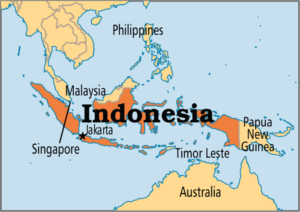
From Operation World
Indonesia
Republic of Indonesia
Asia
Geography
Area: 1,919,317 sq. km
The Republic’s 17,500 islands (6,000 inhabited) stretch over 9.5 million sq. km of the Indian/Pacific Oceans, with 33 provinces, 5 of which have special status. Includes the world’s second-largest rain forest and vast coral reefs.
Population: 232,516,771 Annual Growth: 1.19%
Capital: Jakarta
Urbanites: 53.7%
HDI Rank: 111 of 182 (UN Human Development Reports 2009)
Peoples
Official language: Indonesian (Bahasa Indonesia). Its increasing use is unifying the nation and lessening the importance of smaller languages to the younger generation Languages: 722 All languages
Religion
Largest Religion: Muslim
|
Religion |
|
Pop % |
Ann Gr |
|
36,853,908 |
15.85 |
1.6 |
|
|
13,010,751 |
5.6 |
2.8 |
|
|
Muslim |
186,734,219 |
80.31 |
|
Challenges for Prayer
A spiritual conflict rages for Indonesia. Ancient and strong occult powers seek to oppose the influence of the gospel, while modern Muslim stratagems seek to eliminate Christianity and remove the presence of the good news. Pray specifically for the binding of these powers and for continued growth of the Church in the midst of intense opposition and growing persecution.
PRAYER: Lord, in the Scriptures, we see how Your faithfulness spans the centuries. We see how You have continually acted with the cross of Jesus Christ in view. May we do that also. May we be ever mindful of Your lovingkindness. You are our strength, our hope, our fortress, the glory, and the lifter of our heads.
We do pray for open doors, recognizing that it may mean hardship. Give us the proper mindset to press on with victorious faith.
We pray for Indonesia, a vast country with so many needs. The Islamist vision of an Indonesia without Christians generates intense persecution against believers. Help the Christians there to stand strong. Give them great wisdom and boldness to make an impact for the gospel, drawing the lost to recognize and own Jesus Christ as their Lord and Savior. We ask this in Jesus’ Name. Amen
